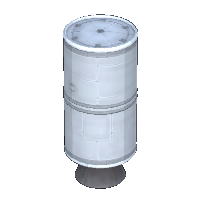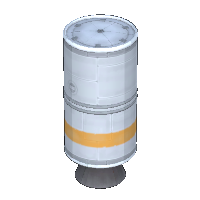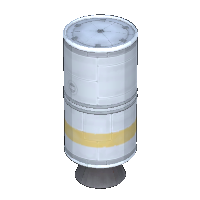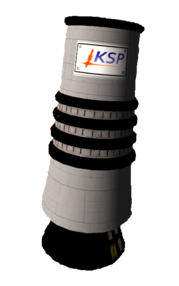Difference between revisions of "RT-10 "Hammer" Solid Fuel Booster"
(→Usage: Complete rewrite to reflect tweakables ( I have a lot of experience with this thing!)) |
AlpacaMall (talk | contribs) m (creating link chain w/ other 1.25m SRBs) |
||
| (23 intermediate revisions by 14 users not shown) | |||
| Line 1: | Line 1: | ||
| − | {{:RT-10 Solid Fuel Booster/Box}} | + | {{:RT-10 "Hammer" Solid Fuel Booster/Box}} |
| − | The '''RT-10 Solid Fuel Booster''' | + | The '''RT-10 "Hammer" Solid Fuel Booster''' is a [[solid rocket booster]] (SRB) used to provide a short burst of additional thrust to a rocket. It comes as a single unit. The ''[[Rocket engine|engine]]'' and ''fuel tank'' are one single part which means that it isn't possible increase the burn time for it by adding more fuel tanks. |
| + | |||
| + | The Hammer is the second engine unlocked in the [[tech tree]]. It is larger than the [[RT-5 "Flea" Solid Fuel Booster]], and smaller than the [[BACC "Thumper" Solid Fuel Booster]]. | ||
| + | |||
| + | == Product description == | ||
| + | {{Quote | ||
| + | |Packing a powerful punch for its size, The RT-10 is widely used in many space programs, whenever the need to save cash is greater than the need to keep astronauts alive. | ||
| + | }} | ||
== Usage == | == Usage == | ||
| − | The | + | The Hammer is a solid rocket booster (SRB) that can be fired once, cannot be shut down or throttled while operating and is notable for its very high specific thrust (500N/kg and does not require separate tanks) and high propellant fraction (0.867). This makes it very useful for the lift-off [[stage]] of a large launch vehicle early in [[Career]] games. While thrust cannot be modulated during flight, the thrust and propellant load can be adjusted using [[tweakables]] by right clicking on the part in the vehicle editor ([[VAB]] or [[SPH]]). This makes it easier to use for smaller boosters. |
| + | |||
| + | Another possible use is as a kick stage for imparting [[Tutorial:Advanced Rocket Design#Delta-V|high impulses]] to a very light payload: in this role, the high propellant fraction of the Hammers offsets the low vacuum [[specific impulse]] and results in a high mass ratio. The high thrust allows a complete burn while in the vicinity of a planet, taking advantage of the [[w:Oberth effect|Oberth effect]]. The short maneuver duration makes the predicted outcome of an associated [[maneuver node]] more accurate. However, since the total delta-V cannot be changed in-flight, careful planning is still required. (The [[LV-909 "Terrier" Liquid Fuel Engine]] is recommended for beginners, reached by researching [[General Rocketry|General]] and [[Advanced Rocketry]] immediately after [[Basic Rocketry]].) | ||
| − | + | Deliberately overheating the Hammer, such as by stacking two and firing the upper before the lower has burned out, allows the motor to function as an ad hoc decoupler (see [[explosive decoupling]].) This is useful in mission-race Career games for maximizing [[Science]] while at the lowest level of the [[technology tree]], before proper decouplers are available. It will also make the crew panic, including [[Jebediah]]. | |
| − | + | Thrust can be regulated with [[tweakable]]s. The minimum thrust required for the booster to lift its own weight off Kerbin's surface is 18%, or about 35 kN. Thrust limiting allows for longer burns with lower acceleration. The specific impulse value remains the same for all thrust-limiter settings. | |
| − | + | == Variants == | |
| + | As of {{version|1.5}} this solid fuel booster has three textures that can be switched in the editor. | ||
| − | == | + | {{multiple image |
| − | + | |align=left | |
| − | | | + | |width=200 |
| − | | | + | |image1=RT-10_White.png |
| + | |alt1=White variant | ||
| + | |image2=RT-10_Orange.png | ||
| + | |alt2=Orange variant | ||
| + | |image3=RT-10_Yellow.png | ||
| + | |alt3=Yellow-White variant | ||
| + | |footer=The different variants of the solid fuel booster | ||
| + | }} | ||
| + | {{clear|left}} | ||
== Trivia == | == Trivia == | ||
| − | Between 0.7.3 and 0.15.2, the RT-10 was of limited use, mainly for providing extra challenge or silliness related to its high thrust to weight ratio. In rare cases it provided a small performance boost from overcoming the sticky pad bug or getting a rocket up to ideal speed. | + | * Between 0.7.3 and 0.15.2, the RT-10 was of limited use, mainly for providing extra challenge or silliness related to its high thrust to weight ratio. In rare cases it provided a small performance boost from overcoming the sticky pad bug or getting a rocket up to ideal speed. |
| − | + | * In {{version|0.16}}, the RT-10 had a specific impulse (I<sub>sp</sub>) of 442.4 s, higher than any other solid or liquid fuel rocket, making a useful, if situational, choice (especially during launch). However, its increased mass in [[0.17]] reduced its I<sub>sp</sub> to 212.4 s. Other than these foibles, the RT-10 is possibly the most consistent original part, still looking and behaving much as it did in the earliest releases. | |
| − | In {{version|0.16 | ||
== Changes == | == Changes == | ||
[[File:RT-10 Solid Fuel Booster.jpg|thumb|The texture from 0.8 to 0.18]] | [[File:RT-10 Solid Fuel Booster.jpg|thumb|The texture from 0.8 to 0.18]] | ||
| + | [[File:Old RT-10 SRB.png|thumb|179px|The texture in 0.7.3]] | ||
| − | ; | + | ;[[1.5]] |
| − | * | + | * New model and texture |
| − | ; | + | * Added 3 variants |
| − | * Full mass increased from 1.8 to 3.5 tons; dry mass increased from 0.36 to 0.5 tons | + | ;[[1.0]] |
| − | ; | + | * Manufacturer changed from Jebediah Kerman's Junkyard And Spaceship Parts to Found Lying By Side Of The Road |
| + | ;[[0.18]] | ||
| + | * New model and texture | ||
| + | ;[[0.17]] | ||
| + | * Full mass increased from 1.8 to 3.5 tons; dry mass increased from 0.36 to 0.5 tons | ||
| + | ;[[0.16]] | ||
* Thrust increased from 130 to 250 (part rebalancing) | * Thrust increased from 130 to 250 (part rebalancing) | ||
| − | ; | + | ;[[0.8]] |
* New texture for the Solid Rocket Booster | * New texture for the Solid Rocket Booster | ||
| − | ; | + | ;[[0.7.3]] |
* Initial Release | * Initial Release | ||
Latest revision as of 19:13, 24 July 2021
| RT-10 "Hammer" Solid Fuel Booster | ||
| Solid rocket booster by Found lying by the side of the road | ||
| Radial size | Small, Radial mounted | |
| Cost | (total) | 400.00 |
| (dry) | 175.00 | |
| Mass | (total) | 3.563 t |
| (dry) | 0.750 t | |
| Drag | 0.2-0.3 | |
| Max. Temp. | 2000 K | |
| Impact Tolerance | 7 m/s | |
| Research | | |
| Unlock cost | 1 200 | |
| Since version | 0.7.3 | |
| Part configuration | solidBoosterRT-10_v2.cfg | |
| Maximum thrust | (1 atm) | 197.90 kN |
| (vacuum) | 227.00 kN | |
| Isp | (1 atm) | 170 s |
| (vacuum) | 195 s | |
| Fuel consumption | 15.83 | |
| Thrust vectoring | No | |
| Burn time | (1 atm) | 20.7 s |
| (vacuum) | 23.7 s | |
| Testing Environments | ||
| On the surface | No | |
| In the ocean | No | |
| On the launchpad | Yes | |
| In the atmosphere | Yes | |
| Sub-orbital | Yes | |
| In an orbit | Yes | |
| On an escape | No | |
| Docked | No | |
| Test by staging | Yes | |
| Manually testable | Yes | |
| Solid fuel | 375 | |
The RT-10 "Hammer" Solid Fuel Booster is a solid rocket booster (SRB) used to provide a short burst of additional thrust to a rocket. It comes as a single unit. The engine and fuel tank are one single part which means that it isn't possible increase the burn time for it by adding more fuel tanks.
The Hammer is the second engine unlocked in the tech tree. It is larger than the RT-5 "Flea" Solid Fuel Booster, and smaller than the BACC "Thumper" Solid Fuel Booster.
Product description
| “ | Packing a powerful punch for its size, The RT-10 is widely used in many space programs, whenever the need to save cash is greater than the need to keep astronauts alive. | ” |
Usage
The Hammer is a solid rocket booster (SRB) that can be fired once, cannot be shut down or throttled while operating and is notable for its very high specific thrust (500N/kg and does not require separate tanks) and high propellant fraction (0.867). This makes it very useful for the lift-off stage of a large launch vehicle early in Career games. While thrust cannot be modulated during flight, the thrust and propellant load can be adjusted using tweakables by right clicking on the part in the vehicle editor (VAB or SPH). This makes it easier to use for smaller boosters.
Another possible use is as a kick stage for imparting high impulses to a very light payload: in this role, the high propellant fraction of the Hammers offsets the low vacuum specific impulse and results in a high mass ratio. The high thrust allows a complete burn while in the vicinity of a planet, taking advantage of the Oberth effect. The short maneuver duration makes the predicted outcome of an associated maneuver node more accurate. However, since the total delta-V cannot be changed in-flight, careful planning is still required. (The LV-909 "Terrier" Liquid Fuel Engine is recommended for beginners, reached by researching General and Advanced Rocketry immediately after Basic Rocketry.)
Deliberately overheating the Hammer, such as by stacking two and firing the upper before the lower has burned out, allows the motor to function as an ad hoc decoupler (see explosive decoupling.) This is useful in mission-race Career games for maximizing Science while at the lowest level of the technology tree, before proper decouplers are available. It will also make the crew panic, including Jebediah.
Thrust can be regulated with tweakables. The minimum thrust required for the booster to lift its own weight off Kerbin's surface is 18%, or about 35 kN. Thrust limiting allows for longer burns with lower acceleration. The specific impulse value remains the same for all thrust-limiter settings.
Variants
As of version 1.5 this solid fuel booster has three textures that can be switched in the editor.
Trivia
- Between 0.7.3 and 0.15.2, the RT-10 was of limited use, mainly for providing extra challenge or silliness related to its high thrust to weight ratio. In rare cases it provided a small performance boost from overcoming the sticky pad bug or getting a rocket up to ideal speed.
- In version 0.16, the RT-10 had a specific impulse (Isp) of 442.4 s, higher than any other solid or liquid fuel rocket, making a useful, if situational, choice (especially during launch). However, its increased mass in 0.17 reduced its Isp to 212.4 s. Other than these foibles, the RT-10 is possibly the most consistent original part, still looking and behaving much as it did in the earliest releases.
Changes
- New model and texture
- Added 3 variants
- Manufacturer changed from Jebediah Kerman's Junkyard And Spaceship Parts to Found Lying By Side Of The Road
- New model and texture
- Full mass increased from 1.8 to 3.5 tons; dry mass increased from 0.36 to 0.5 tons
- Thrust increased from 130 to 250 (part rebalancing)
- New texture for the Solid Rocket Booster
- Initial Release
| ||||||||||||||||||||||||||||




